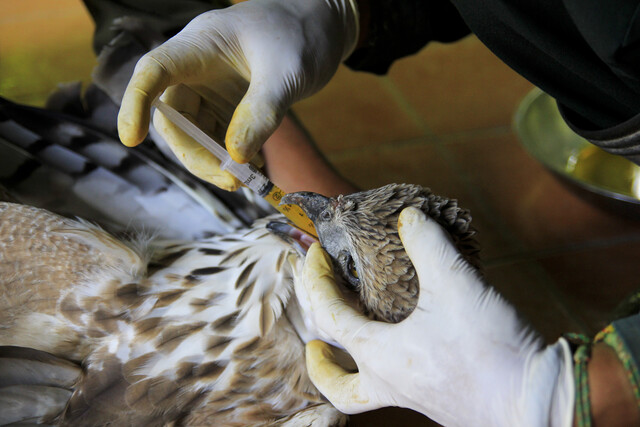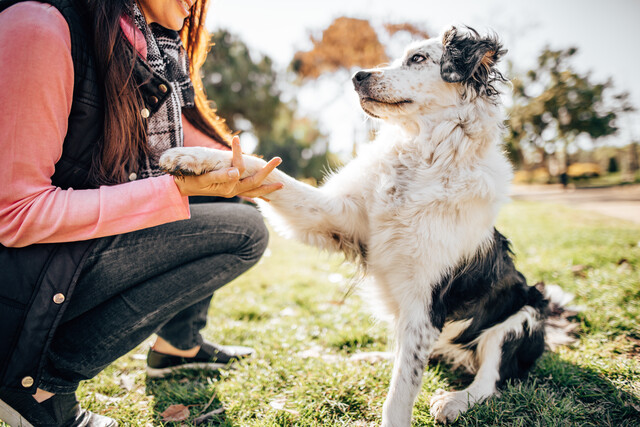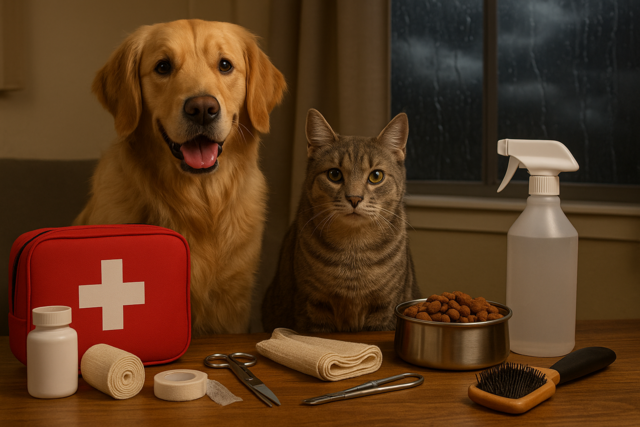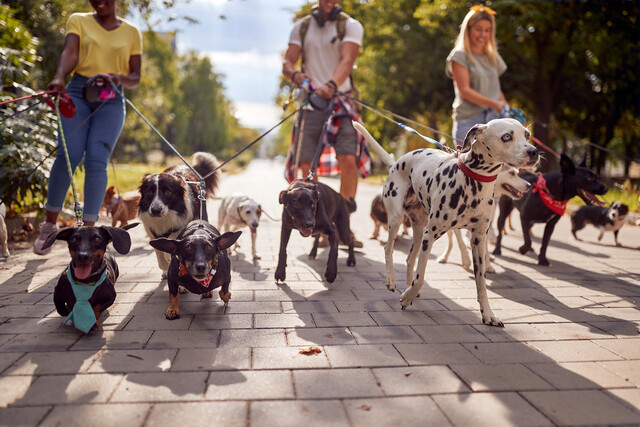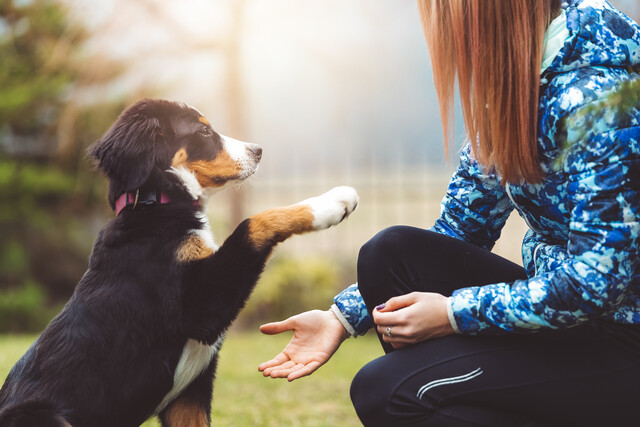?
Dogs are expensive. When you get a goldfish, you will usually discover that it's sick when it dies. Even small pets like hamsters rarely make it to the veterinarian and can typically be purchased - along with a habitat - for less than $50.00. If these are the types of pets you're used to, it's imperative that you understand the financial repercussions of getting a dog.
Getting the dog
There are essentially four ways to get a dog: through a breeder, through an animal shelter, at a pet store, or from an accidental litter. There are pros and cons with each of these methods; you will need to decide which process is the right one for you.
Dog breeders typically produce purebred dogs, then sell them at an impressive profit. Licensed and registered dog breeders are usually required to breed their animals in humane ways while ensuring the legitimacy of the breed. These breeders typically accept applications from potential owners and try to find appropriate and well-matched homes and families for the dogs they breed. These dogs usually have papers that detail their family lineage to prove their purebred status. These dogs tend to come at the highest prices; each purebred puppy will cost you hundreds of dollars or more.
At animal shelters, you can potentially save the life of any dog you adopt. Many shelters (even those who call themselves no-kill shelters) will euthanize animals that are deemed to be un-adoptable simply do to the fact that no one has chosen to adopt them yet. Sometimes when a shelter is designated as a "no-kill" shelter, they really only mean that they do not kill the dogs onsite themselves. Many such shelters transport "unadoptable" dogs to local veterinarians in order to be put down. While there are excellent points on both sides of the aisle on the topic of euthanization, it's important that you have all of the information to make your best decision.
Many people are hesitant to get animals from shelters because they believe that shelter dogs have been abandoned for a reason (such as aggression towards a person or other animal); this is simply myth. The vast majority of dogs surrendered to shelters are loving, peaceful animals who simply had owners that were unable or unwilling to care for them for reasons that had nothing to do with the pet itself. Adopting a dog through an animal shelter is much cheaper than going with a certified breeder and there are many purebred dogs available in shelters.
Many dog owners, especially those in rural areas, don't always spay or neuter their pets. In these situations, accidental litters occur frequently. Many of these individuals prefer to find owners for the puppies on their own rather then abandon them at a shelter where they may end up being killed. Hence, adopting a dog from an accidental litter can be as lifesaving for the dog as adopting it directly through a shelter. Most accidental litters are not purebred (though it can occur) and typically cost very little to get the dog.
Generally speaking, if having a purebred dog with papers detailing their lineage is important to you, a reputable dog breeder may be your best bet; with a dog breeder, you also have access to information regarding the dog's family and upbringing prior to your purchase. If you don't feel strongly about the dog being registered (even if you still want a purebred dog) and want to save a life, adopting from a shelter may be your best bet. Although you may not know anything about the dog's life prior to your adoption, adopting from a shelter also helps ensure that the dog is currently in good health as they'd typically see a veterinarian prior to adoption. If you are more flexible about breeding, an accidental litter may be an excellent match for you. You may or may not know the health of the dog you get from an accidental litter; you are likely to be able to get a little information regarding the dog's parents and its life prior to adoption.
A word about "backyard breeders": This type of breeder or situation (also sometimes referred to as a "puppy mill") should be avoided. These breeders often (though not always) use unethical practices in order to generate as many puppies as possible, then sell them off as purebred at a "discounted" price. Many puppy mills will try to pass them sells off as registered breeders or accidental litters. Generally speaking, if someone will sell you a dog priced between $100 and $250, they are likely to be a backyard breeder. Licensed breeders can show you verification that they are registered and accidental litters (which often charge a small amount to ensure a potential owner has good intentions) will usually charge less than $100.
Many people may go to their local pet store in order to select a dog. It's extremely important to understand that different pet stores get their dogs in radically different ways. Most pet stores that sell dogs actually purchase the dogs from backyard breeders - many times the same ones that are practicing cruel and inhumane methods of breeding. Alternatively, some pet stores don't "sell" dogs but actually provide a selection of dogs to be adopted; these stores usually work with local animal shelters and humane societies to adopt the dogs out. It is worth noting that when you adopt a dog from an animal shelter, whether it's through a pet store or directly from the shelter, you will be expected to pay a fee (which typically includes their first set of shots as well as the spaying/neutering of the dog). If you're not sure whether or not the store is working with an animal shelter or humane society, simply ask. If you are at all uncertain about the clarity of their answer, feel free to contact a local animal shelter which will be able to let you know whether or not the store is selling or facilitating the adoption of the dogs.
Typical costs
Before you get a dog, you'll need to evaluate whether or not the regular care of the dog will be feasible within your monthly budget. Although there are programs out there that offer low-cost spay and neuter services, even regular care for your dog can be quite expensive.
Basic veterinary care is also quite expensive. Getting a dog spayed or neutered, receiving vaccines, and basic checkups all add up very quickly. The first year of your dog's life will typically be the most expensive since this would ideally be when they would receive the majority of their vaccinations as well as being spayed or neutered. After the first year, periodic checkups and booster shots (as required by law based on your state) will usually be less expensive but can still add up quickly. While a veterinary bill may come with a bit of sticker shock, the reality is that your veterinarian is well educated and well trained to do what they do. Veterinarians are, in fact, doctors for animals and their training and education amounts reflect this. Be realistic about what you expect to be charged.
The finances associated with getting a dog are substantial even under the best circumstances. When you consider getting a dog, as well as what type of dog you want to get, you also need to consider atypical costs and your likelihood for having them. If you have a dog with special needs, you will need to provide for them.
Grooming
Depending on the breed of the dog you get, you may need to factor in grooming costs. While many dogs can be properly groomed at home through regular baths, frequent brushing, and safe use of a pair of nail clippers (designed for dogs), it may not always be feasible to groom your dog at home (especially without pricey equipment). As we discuss different types of breeds, you will find that some breed groups are more likely to have lengthy coats or curly hair which often needs frequent grooming. Some breeds are also more challenging to groom yourself due to their size, color and/or shape; clipping black nails of a 3 pound black Chihuahua can be difficult to do without tremendous experience.
Allergies
Parasites
Virtually all dogs are susceptible to parasites from heartworms to fleas as well as the infections and other problems they cause. The costs associated with heartworm prevention are no small matter and treating a flea infestation can be expensive as well. Some dogs may be slightly more predisposed to mange and eczema but generally speaking, while costly, these medical problems generally occur at about the same rate across different breeds.
Specific health problems
When it comes to purebred dogs, the health problems are many. The same attributes of a dog that you may find adorable, such as the smushed snout and buggy eyes of a pug, may also be what causes them the most problems (pugs are highly susceptible to respiratory and eye problems). A dog's build will often take its toll as well, with certain breeds being more susceptible to certain problems. Again, if you want a purebred dog, educate yourself ahead of time so that you know what to expect and what you can help prevent. For example, chihuahuas are prone to throat and windpipe injuries; this predisposition can be minimized simply by using a harness rather than a collar.
Mixed breed dogs tend to have fewer major health problems. In fact, some believe that the wider the gene pool in the dog, the less likely the dog is to have health issues. A mixed breed dog may consist of two purebred lines or a tremendously unique combination of many lines. Thus, there is a difference between something akin to a "designer" dog such as a Puggle (a combination of a pug and beagle), a typical mixed breed dog (who often have three to five or six different breeds), and a "mutt" whose lineage is quite difficult to discern. Generally speaking, a designer dog produced by a reputable and caring licensed breeder should have the highest likelihood of good health since its lineage is balanced to make it that way. After that, traditional mixed breeds and mutts have the higher likelihood of good health and purebred dogs are much more likely of suffering from significant health problems.
Obviously, the characteristics you want your dog to have, especially those that match up well with a particular breed, have to be balanced with whether or not you can provide your dog the level of health care it is likely to need. In other words, if you determine that a dachshund is a great fit for your personality, lifestyle, and purpose, you must also consider whether or not you can afford to accommodate for the health problems it is likely to have such as hip dysplasia and patellar luxation.
Special needs and disabilities
Pet insurance
As you consider what type of dog you want to get, you should begin researching pet insurance options. Obviously, for some dogs pet insurance may be a waste of money or simply an unaffordable regular expense for many pet owners. If you are considering getting a purebred dog or even a mixed breed that includes a breed type that is particularly susceptible to health problems, seriously consider pet insurance. Like human health insurance, preexisting conditions are often not covered so if you anticipate health problems due to your dog's lineage, chances are excellent that it will save you a lot of money to invest in pet insurance when they are young. If you are unsure about what type of coverage you need, talk with your veterinarian. He or she should be able to give you some idea of how likely you are to need it and how much coverage is ideal.
End of life
Be aware that regardless of what type of dog you get, you may have to make tough decisions as they age. Dogs that are older are likely to develop any number of problems ranging from cancer to osteoporosis and you will have to choose whether or not to precede with treatment or to terminate your pet's life. If you choose to precede with treatment, expenses can be extremely high.








